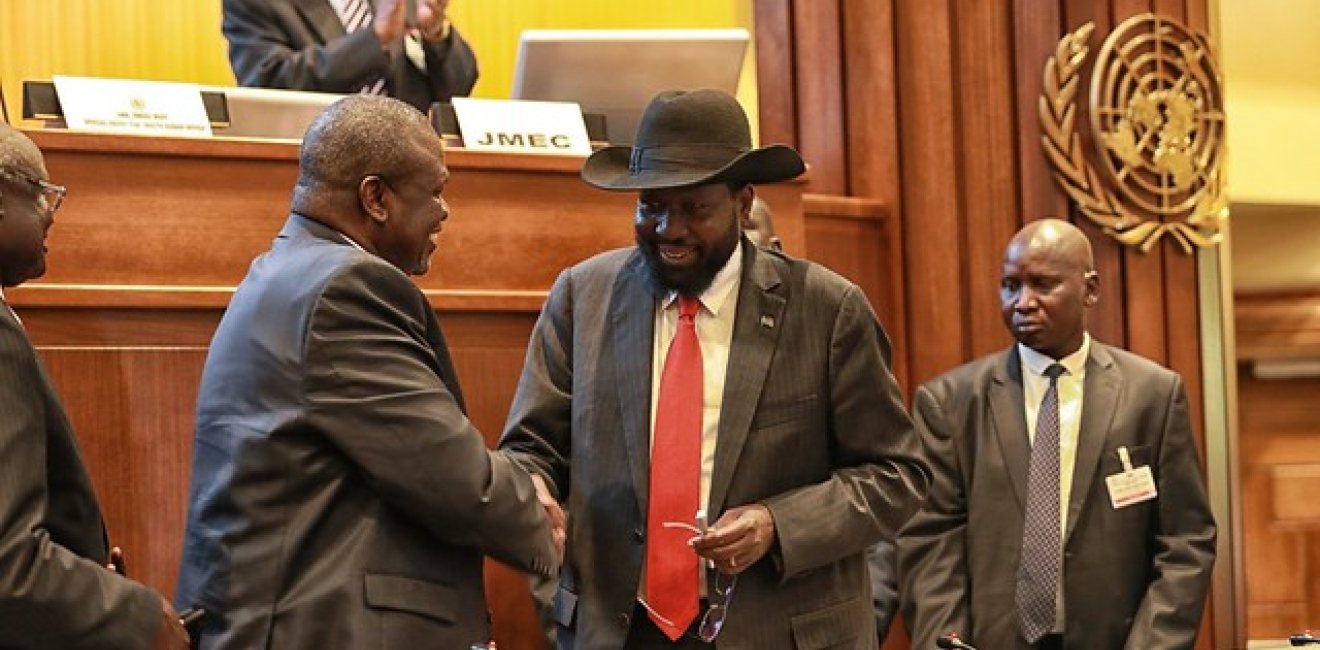
A blog of the Africa Program
The signing of the Revitalized Agreement on the Resolution of the Conflict in South Sudan (R-ACRSS) on September 12, 2018, has led to relative peace in South Sudan. Mediated by the Intergovernmental Authority on Development (IGAD) — a regional economic and security bloc — South Sudanese policymakers recently extended the 'pre-transitional' period until November 2019 before forming the transitional government of national unity. Given the few months remaining before this new deadline, there are serious concerns that many key tasks remain to be addressed: namely, the issue of the number and boundaries of provinces/states, violent conflicts, a single national army, and securing the funding necessary for implementing the peace agreement. These cumulative factors hamper the peace process, foreshadowing future outbreaks of violence.
Lack of Consensus on the Number of States
Per the peace agreement, the Technical Border Committee (TBC) and the Independent Boundaries Commission (IBC) are tasked with the demarcation of tribal boundaries and the determination of the number of states respectively. Both of them, however, failed to meet their proposed timelines within the stipulated period. Their tasks are made more difficult by President Salva Kiir, who has increased the number of states from 10 to 32, inviting significant public debate. The Sudan People's Liberation Front-In Opposition (SPLM-IO) has expressed support for reverting to the original 10 states-plan in line with the August 2015 agreement, but the government is eager to maintain the 32 states to take advantage of the formula for power-sharing. Many of the new states are dominated by the nation's largest ethnic group and President Salva Kiir's political base — the Dinka. The creation of 32 states would allow the president to claim majority representation in at least half of the states. This has direct implications for decision-making, especially for the law-making body that favors the president and his team.
Recurrent Conflict and Human Right Abuse
The conflict in South Sudan has been marked by ethnic violence and brutal atrocities, leaving more than 380,000 dead while some four million have fled their homes. Despite the signed 2018 ceasefire, fighting has continued between government forces and the National Salvation Front (NAS) in the Central Equatoria region, with civilians "deliberately and brutally targeted," per the UN Mission in South Sudan (UNMISS)."At least 104 people have also been killed in attacks on villages in the southern region. A roughly similar number of women and girls were raped or suffered other sexual violence…" Moreover, the 2019 World Report by Human Right Watch noted that all conflicting parties committed indiscriminate attacks against civilians and aid workers, which included unlawful killings, beatings, arbitrary detentions, torture, sexual violence, the recruitment and use of child soldiers, as well as looting and the destruction of civilian property. Some of the abuses even constitute war crimes or crimes against humanity.
The Progression of National Security Reform
On the ground, progress in security sector reform, including DDR (disarmament, demobilization, and reintegration), governance, and rule of law, among other things, have been sluggish. Efforts to unify the armed forces have also been weak, even though the government allocated USD $100 million for security reform. One of its biggest hurdles has been the creation and management of cantonment sites, where troops and rebels are screened, trained, and integrated into a single national army. Even more so, it has made slow progress, operating behind schedule. The revitalized agreement also provides for the return of opposition leader Riek Machar from exile to serve as vice president in a power-sharing government. However, there have been no regular face-to-face meetings between him and President Kiir to talk about the revitalized agreement. This harms public trust and confidence for the conflicting parties to lead a new unified government. On June 26, 2019, DavidShearer, head of UNMISS, stressed the importance of regular meetings between President Salva Kiir and Riek Machar to boost the slow peace implementation process. Following pressures from internal and external actors, Riek Machar arrived in Juba on September 9, 2019, for face-to-face talks with President Salva Kiir in a bid to rescue the stalled peace agreement.
The Way Forward
It is not too late for international actors — such as the C5 (the AU's High-Level Ad Hoc Committee for South Sudan, composed of South Africa, Algeria, Chad, Nigeria, and Rwanda), the African Union, IGAD, United Nations, and the Troika (US, Britain, and Norway) — to engage President Salva Kiir and Riek Machar, highlighting the importance of their participation for direct talks on the implementation process. Such an approach may also inspire public confidence and facilitate reconciliation at all levels of the nation. Yet, the aforementioned tasks cannot be realized without adequate funding. Stakeholders should forego further extensions to forming the transitional government. Furthermore, to avert the risk of differences arising from contradicting positions on the number and boundaries of states, the IBC would do well to engage with the relevant South Sudanese stakeholders, especially the AU, IGAD, and C5 to facilitate a compromise.
Getachew Zeru is an Assistant Professor at the Institute of African Governance and Development at Ethiopian Civil Service University, Addis Ababa, Ethiopia. He was a former Southern Voices Scholar Network for Peacebuilding in spring 2015.
Author

Lecturer, Institute for Peace and Security Studies, Addis Ababa University

Africa Program
The Africa Program works to address the most critical issues facing Africa and US-Africa relations, build mutually beneficial US-Africa relations, and enhance knowledge and understanding about Africa in the United States. The Program achieves its mission through in-depth research and analyses, public discussion, working groups, and briefings that bring together policymakers, practitioners, and subject matter experts to analyze and offer practical options for tackling key challenges in Africa and in US-Africa relations. Read more

Explore More in Africa Up Close
Browse Africa Up Close
The Innovative Landscape of African Sovereign Wealth Funds



